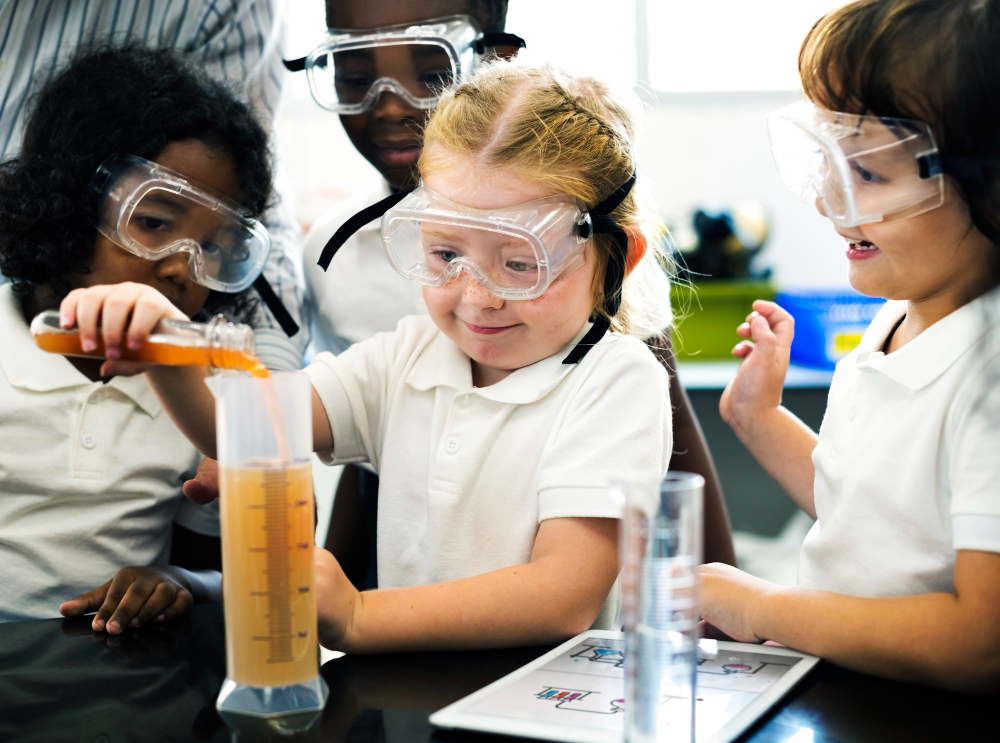
Through interactive activities, expert presentations, and collaborative projects, science workshops inspire curiosity, foster critical thinking skills, and prepare students for success in school and beyond. Science workshops for primary schools offer valuable opportunities for students to engage in hands-on learning experiences, explore scientific concepts, and develop essential skills in a fun and interactive environment. These workshops are designed to complement classroom instruction and curriculum standards, providing students with memorable and meaningful experiences that ignite curiosity, foster critical thinking, and inspire a lifelong love of science.
Purpose of Science Workshops
-
Hands-On Learning: Science workshops provide students with opportunities to actively participate in experiments, demonstrations, and activities that reinforce classroom learning and allow them to see scientific principles in action.
-
Exploration and Discovery: Workshops encourage students to ask questions, make observations, and draw conclusions through inquiry-based activities that promote exploration, discovery, and experimentation.
-
STEM Education: Science workshops often integrate elements of STEM (Science, Technology, Engineering, and Mathematics) education, helping students develop interdisciplinary skills such as problem-solving, teamwork, and creativity.
-
Real-World Applications: By connecting scientific concepts to real-world phenomena and applications, workshops help students understand the relevance and importance of science in everyday life and future careers.
-
Engagement and Motivation: Hands-on activities and interactive demonstrations captivate students’ interest and motivation, making learning enjoyable and memorable while fostering a positive attitude towards science.
Components of Science Workshops
-
Experiments and Demonstrations: Workshops typically include a series of experiments, demonstrations, or hands-on activities designed to illustrate specific scientific concepts and principles. These activities may cover topics such as physics, chemistry, biology, earth science, or environmental science.
-
Interactive Learning Stations: Workshops often feature interactive learning stations where students can explore different aspects of science through self-directed exploration and experimentation. Stations may include exhibits, models, or technology-based simulations.
-
Expert Presentations: Science workshops for primary schools may include presentations or demonstrations by guest speakers, scientists, or experts in various fields of science, providing students with valuable insights, perspectives, and career role models.
-
Collaborative Projects: Workshops often incorporate collaborative projects or group activities that promote teamwork, communication, and problem-solving skills. Students work together to design, build, or investigate scientific phenomena, fostering a sense of collaboration and shared achievement.
-
Reflection and Discussion: At the end of the workshop, students engage in reflection and discussion activities to consolidate their learning, share their observations and insights, and make connections between the workshop activities and classroom concepts.
Implementing Science Workshops in Primary Schools
Integrating science workshops into the primary school curriculum requires careful planning, collaboration, and resources. Here are some key considerations for implementing science workshops effectively:
-
Curriculum Alignment: Ensure that science workshops align with curriculum standards and learning objectives, providing opportunities for students to apply and reinforce classroom concepts through hands-on activities and exploration.
-
Teacher Training: Provide professional development opportunities and training for teachers to facilitate science workshops effectively. Teachers should be familiar with workshop content, materials, and safety procedures, as well as strategies for promoting inquiry-based learning and student engagement.
-
Resource Allocation: Allocate sufficient resources, including funding, materials, and equipment, to support science workshops in primary schools. Consider partnerships with local science centers, museums, universities, or community organisations to access additional resources and expertise.
-
Scheduling and Logistics: Coordinate scheduling and logistics to ensure smooth implementation of science workshops within the school day. Determine the frequency, duration, and timing of workshops to accommodate classroom schedules and curriculum requirements.
-
Parent and Community Involvement: Engage parents and the community in supporting science education initiatives and workshops. Encourage parents to volunteer as workshop facilitators or provide donations of materials and supplies to enhance the learning experience.
-
Assessment and Evaluation: Develop assessment tools and evaluation measures to assess student learning outcomes and the effectiveness of science workshops. Gather feedback from teachers, students, and parents to inform ongoing improvements and adjustments to workshop content and delivery.
Examples of Science Workshop Topics
-
Exploring the Solar System: Students investigate the planets, moons, and other celestial bodies in the solar system through hands-on activities, simulations, and interactive demonstrations.
-
Chemical Reactions: Students explore the principles of chemistry through experiments and demonstrations that illustrate chemical reactions, properties of matter, and the periodic table.
-
Ecosystems and Biodiversity: Students learn about ecosystems, habitats, and biodiversity through interactive activities, role-playing games, and field trips to local parks or nature reserves.
-
Engineering Design Challenges: Students engage in engineering design challenges that encourage creativity, problem-solving, and innovation, such as building bridges, towers, or vehicles using everyday materials.
-
Robotics and Coding: Students learn basic principles of robotics and coding through hands-on activities with programmable robots, coding games, and challenges that teach sequencing, algorithms, and problem-solving.
Benefits of Science Workshops for Primary Schools
-
Enhanced Learning Outcomes: Science workshops for primary schools reinforce classroom learning and help students develop a deeper understanding of scientific concepts through hands-on exploration and inquiry-based activities.
-
Increased Engagement: Hands-on activities and interactive demonstrations capture students‘ interest and enthusiasm, making learning enjoyable and motivating them to explore further.
-
Improved Critical Thinking Skills: Workshops encourage students to think critically, analyze data, draw conclusions, and communicate their findings, fostering essential skills for scientific inquiry and problem-solving.
-
Inspiration and Aspiration: Exposure to real-world science and interactions with scientists and experts inspire students to pursue further studies and careers in STEM fields, broadening their horizons and aspirations for the future.
-
Positive Attitude Towards Science: Engaging in hands-on science experiences in a supportive and encouraging environment cultivates a positive attitude towards science and learning, laying the foundation for lifelong curiosity and exploration.
Conclusion
In conclusion, science workshops for primary schools play a vital role in promoting hands-on learning, exploration, and discovery in science education. By providing students with opportunities to engage in experiments, demonstrations, and collaborative projects, workshops enhance learning outcomes, increase engagement, and inspire a passion for science. Through interactive activities, expert presentations, and reflection, workshops foster critical thinking skills, teamwork, and a positive attitude towards science, preparing students for success in school and beyond.








